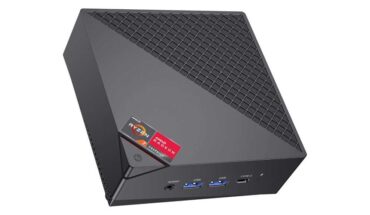Long-time readers of his column will know that the Macalope is not above grazing on low-hanging fruit. Far from it. First of all, who doesn’t like a nice piece of fruit? Second, it’s right there. At mouth level.
C’mon.
So, you might think he’s going to chomp into a mouthful of Mark Zuckerberg’s comments about Apple on Joe Rogan’s podcast. Yes, the guy who acquired Instagram and acquired Oculus and acquired WhatsApp and acquired Messenger thinks Apple doesn’t invent anything anymore.
Okay.
No, the Macalope is going to eschew Zuckerberg’s bitter barbs and instead take a look at, well, some other low-hanging fruit: Dell’s rebranding effort. (Look, the Macalope’s not made of stone. If they don’t want the Macalope to graze on it, stop hanging it so low.)
For a company that doesn’t make anything anymore, Apple sure gets copied a lot. This time, however, it’s names.
Dell announced that it is ditching names like “Inspiron” and “Latitude” in favor of some it totally came up with on its own, what are you even talking about, they resent the suggestion: Dell, Dell Pro, and, um, Dell Pro Max.
Any similarity to existing product names, living or dead, is purely coincidental.
Michael Dell even got into a huff when called out on it:
… I asked CEO Michael Dell a simple question: “What does Dell gain by copying Apple?” Needless to say, he didn’t look pleased.
He always looks like that. He’s got resting Michael Dell face.
This got the Macalope thinking about companies copying Apple, from smartphones to laptop designs to even product naming conventions. We laugh about it, but it really does a disservice to the industry as a whole.
And, to be clear, it’s not just other companies copying Apple, although they certainly take their cues from Apple. Let’s be generous and call it more of a herd mentality. The market is supposed to give us choice, but very often it settles on a particular type of product and everyone makes small variations of it. (Companies even herd on how much to donate to incoming U.S. presidential administrations that have said they’ll put tariffs on companies that don’t play ball.)

IDG
Let’s talk about small phones.
Yes, again.
No, you get over it.
Not only does Apple not make a small phone anymore, but it continues to bump its existing screen sizes every couple of years. Reportedly, the size of the base iPhone 17–the current one, at a not-insubstantial 6.1 inches, having been ranked by Marques Brownlee as the best small phone of 2024–will increase to 6.3 inches.
The Macalope might be tempted to huff dramatically and suggest that he will simply take his business elsewhere (like he would really do that other than as a stunt), but he simply can’t. There aren’t any. All of these companies making smartphones and you can’t get a small one.
Well, that’s not completely true. You can’t get a name-brand small phone. Some somewhat fly-by-night companies sell phones with screens as small as 4 inches, but they have slower processors, lower quality materials, and poor to no support.
Android Authority helpfully provides lists of the best small smartphones of whatever year of our Lord it happens to be. The problem is, the definition of “small” has become so warped by the current obsession with making aircraft carrier-sized phones that all the phones on the list have screens that are 6.1 inches or larger.
That is not a small phone.
Living in the Apple ecosystem has always meant dealing with fewer choices, but all of the name-brand smartphone manufacturers have simply decided that every phone should be large. As Apple came relatively late to larger phones, we could say this was an instance of the company copying others. But however you chicken-and-egg this, no one is targeting people who might want smaller phones. The Macalope bit the bullet and upgraded to the 6.1-inch iPhone 16 this past fall, now he’s hearing he needs to go a 6.3-inch phone if he wants to upgrade again?
Ungulates are usually all for herding, but this is getting ridiculous.





